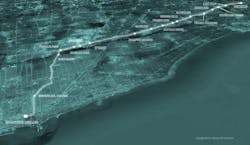Chicago RTA study identifies costs, potential local funding strategies for service improvements along Metra NCS
A study of potential service improvements along Metra’s North Central Service (NCS) Line and the feasibility of various finding mechanisms to support such improvements has been completed by the Chicago area’s Regional Transportation Authority (RTA).
The RTA partnered with the village of Mundelein, the Lake County Transportation Alliance and a steering committee made up of representatives from 17 other communities along the rail line to complete the NCS Corridor Analysis and Implementation Study. Following budget-related service cuts to the line in 2017, the village of Mundelein applied for technical assistance through the RTA’s Community Planning program for this project. This study was completed prior to the COVID-19 pandemic, which resulted in temporary changes to the NCS schedule.
“NCS improvements could advance local and regional multi-modal and transit-oriented development goals, but fiscal constraints require innovation and collaboration,” said Leanne Redden, RTA executive director. “This study takes a productive first step to understand the scope and bring together leaders from along the corridor to discuss solutions. The RTA hopes to be part of a continued dialogue about the future of the NCS.”
As part of the study, a survey of NCS riders asked them to rank their most desired service improvements. Forty-four percent ranked the addition of weekend service as their top requested service improvement, while 39 percent of those who used the line frequently (5-10 trips a week) said they would prefer more weekday commute service.
The study identifies three possible scenarios for potential service improvements, including a range of additional weekend or weekday trains. Each scenario includes estimates of capital, maintenance and net annual operations costs, as well as an analysis of funding mechanisms. Further study will be necessary to determine the level of demand for expanded NCS service.
The study also made important strides toward corridor-wide consensus to work together to improve transit access. Near the end of the study, steering committee members were asked to vote on whether or not their community’s leadership was committed to working in partnership with other municipalities and regional agencies to advance long-term NCS improvements — 21 of the 25 voting members said “Yes.”
“The communities and agencies along the NCS lines spent real dollars opening, maintaining and planning for growth and utilization of the Metra Stations,” said Amanda Orenchuck, village of Mundelein community development director. “As a line in its infancy, there is much untapped potential that requires significant investment that can only be realized by communities and agencies working together to understand this line’s benefits and challenges. This complex issue can only be improved through mutual cooperation and understanding.”
While traditional federal funding for any of the scenarios would be unlikely, the study describes innovative local funding options that could be explored as part of a multijurisdictional partnership. If successful, the basics of the funding model could be applicable in the future along other transit lines.
“The continued interest of NCS communities in growing ridership and increasing service levels speaks to the value that Metra provides to these communities,” said Jim Derwinski, Metra CEO/executive director. “While Metra has ongoing funding challenges to deliver regular service levels, this study lays out clear options for new local funding sources that could be used to grow service on the NCS Line, as demand warrants. Metra is committed to working with the NCS communities to explore those possibilities going forward.”
